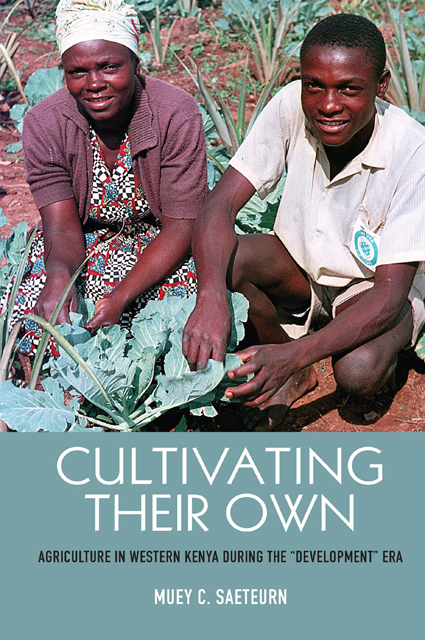Book contents
- Frontmatter
- Dedication
- Contents
- Acknowledgments
- Acronyms and Abbreviations
- Maps
- Introduction
- 1 The Role of Agriculture in Kenya’s Political Economy in the Era of Transition and Independence
- 2 Western Kenya’s Region, People, and the Origins of Population Density
- 3 Chavakali Secondary School: A Place of Learning and Farming
- 4 “Doing Their Part”: 4-K Farmers’ Clubs
- 5 Friends and Acres: The Friends Africa Mission Stewardship Program
- 6 “Home is Home”: The Lugari Settlement Scheme and Maragoliland
- Conclusion: Agricultural Production—The New (Old) Sexy
- Appendix: Interviewee Information
- Notes
- Bibliography
- Index
3 - Chavakali Secondary School: A Place of Learning and Farming
Published online by Cambridge University Press: 18 January 2023
- Frontmatter
- Dedication
- Contents
- Acknowledgments
- Acronyms and Abbreviations
- Maps
- Introduction
- 1 The Role of Agriculture in Kenya’s Political Economy in the Era of Transition and Independence
- 2 Western Kenya’s Region, People, and the Origins of Population Density
- 3 Chavakali Secondary School: A Place of Learning and Farming
- 4 “Doing Their Part”: 4-K Farmers’ Clubs
- 5 Friends and Acres: The Friends Africa Mission Stewardship Program
- 6 “Home is Home”: The Lugari Settlement Scheme and Maragoliland
- Conclusion: Agricultural Production—The New (Old) Sexy
- Appendix: Interviewee Information
- Notes
- Bibliography
- Index
Summary
As the seventeenth child of a twenty-one-child household, Joram Clement Chavasuh appreciated that Chavakali secondary school opened in his home village in western Kenya. Chavasuh was a “pioneer student” belonging to the rural high school’s inaugural class of thirty-six male students that started on January 12, 1959, in a modest one-room block of four rooms “built of locally fired brick, laid up with mud and pointed up with mortar on the outside, under a sheet iron roof.” For Chavasuh, who was twenty years old when he started high school, Chavakali secondary school was the place where he would diversify his skills and explore careers outside of agriculture. Making a living off the land, which was what the late colonial Kenyan government and, subsequently, the Kenyatta regime expected from rural people like himself, was neither appealing nor was it a realistic option for Chavasuh at the time. His status as a junior son, for instance, precluded his making any strong claims to a sizable and productive plot of land on his father’s overworked five-acre plot in Chavakali. Moreover, as one of the few in his family to receive an education, Chavasuh’s parents expected him to pursue job opportunities in towns, which their national leaders promised would become more available to “learned” Kenyans as the country transitioned from a British colony into an independent nation-state throughout the early 1960s. Chavakali high school, in short, was to help Chavasuh secure a more comfortable future that did not involve having to depend on the land solely for his livelihood in the postcolony.
However, promoting and training young Kenyans for careers in the agrarian sector and thus to appreciate “the significance of agriculture to the future of economic development of Kenya” was a task that Chavakali’s administrators, namely the local Nyanza District officials and the American Friends (Quaker) Africa Mission (FAM) missionaries, undertook from the start. They did so largely because of the lack of industries and, to some degree, self-serving local church and government officials who depended on educated young and ambitious people to stay local in order to maintain business affairs. Chavakali administrators and rural “specialists” consequently emphasized practical training in its curriculum, which they hoped would provide students with the skills and mindset to remain in the countryside and to participate in Kenya’s agrarian-based economy as skilled farm managers and laborers.
- Type
- Chapter
- Information
- Cultivating their OwnAgriculture in Western Kenya during the 'Development' Era, pp. 56 - 75Publisher: Boydell & BrewerPrint publication year: 2020

